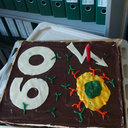Malnutrition and the role of nutritional support for radiation therapy patients.
Keywords
Abstract
The nutritional status of a tumor patient can be negatively influenced by the local and systemic effects of the malignant tumor (tumor cachexia, anorexia, difficult oral food intake), by the effects of the various antitumoral therapy modalities (surgery, radiotherapy, chemotherapy), and by the complications associated with such modalities (anorexia, nausea, vomiting, mucositis, xerostomia, alterations of the smell and taste sensations, odynophagia, dysphagia, maldigestion, malabsorption, diarrhea, steatorrhea, conditioned aversions, radiogenic late effects), as well as by the psychological reactions of the patient to the real or feared existence of his tumor. The radiation-induced nutritional disorders depend on the tumor localization, the region irradiated, the dose and length of radiotherapy, the fractionation, the volume irradiated, and the combination with other therapeutic modalities ("combined modality therapy"). The acute radiation-induced reactions are usually of limited duration and for this reason tend to interfere with the nutritional status to a lesser extent than the permanent chronic consequences of irradiation. Weight loss and malnutrition tend to develop particularly in patients in whom segments of the gastrointestinal tract are subjected to irradiation. The incidence and severity of deficient nutrition depend not only on the region irradiated (head-neck region, thorax, abdomen, pelvis) but also, and most particularly, on the volume of the digestive tract irradiated. Chemotherapy and radiotherapy combined act very strongly on rapidly proliferating cell populations (skin, mucosa, epithelium of the gastrointestinal tract). In this context, actinomycin D and adriamycin act like real sensitizers, whereas the majority of the other drugs are likely to produce only an additive effect. The first named cytostatics give rise to the so-called recall phenomenon, i.e., the reactivation of latent radiation effects in response to the subsequent administration of the drug. Malnutrition impairs organ function and ultimately results in increased morbidity and mortality. For this reason it has proven mandatory and reasonable that the organism of all tumor patients suffering from malnutrition is provided with the missing essential nutrients (especially amino acids for protein synthesis). This tends to clearly improve the Karnofsky performance status, with a positive effect on response rates, toxicity, and survival rates in retrospective studies.(ABSTRACT TRUNCATED AT 400 WORDS)


